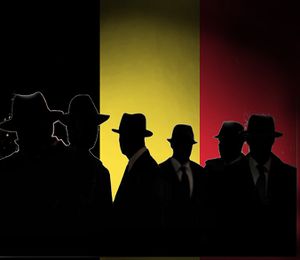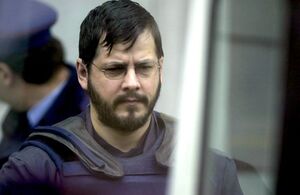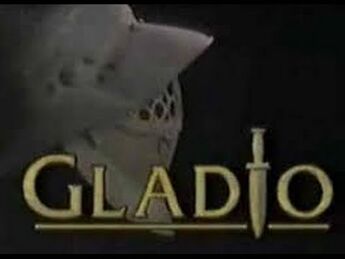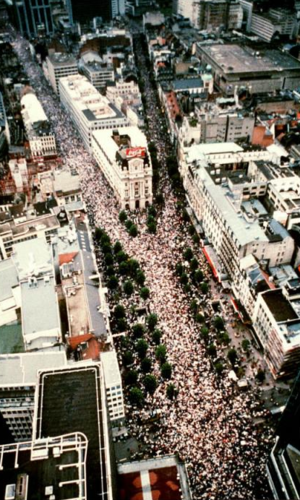Belgium/Deep state
(Deep state) | |
|---|---|
 | |
| Abbreviation | BE/DS |
| The Belgian Deep state, most significantly exposed by the Dutroux Affair, appears to employ similar methods of control to other European deep states, including bribes, sexual blackmail, intimidation and assassination. | |
The Belgian Deep state was most significantly exposed by the Dutroux Affair which saw up to 4% of the population marching in 1996 to protest the injustice and incompetence surrounding the case. The Brabant Massacres were another significant exposure, since they were linked to Operation Gladio.
Functions
Brussels
- Full article: Brussels
- Full article: Brussels
Brussels is headquarters of NATO. The activities of Willem Matser have strengthened suspicion that, as Sibel Edmonds alleges, it is a conduit for large scale drug trafficking.
History
The Belgian nobility has historically dominated the army and diplomatic service and continues to be influential to this day.[1]
19th century
The Berlin Conference of 1884-5 formalized many of the European colonial powers' claims in Africa. King Leopold II of Belgium was personally granted control oh a large, resource-rich piece of central Africa, the Congo River basin. Plunder from this provided a lot of wealth to the Belgian Court and court officials, centered on the royal family. The royal family has a history of involvement in VIPaedophile activities, including King Leopold II and King Albert[2]
20th century
1900s
1910s
1920s
1930s
Paul van Zeeland was Belgian Prime minister. A suspected deep politician, he held various posts after WW2 and attended 6 Bilderberg meetings in the 1950s.
1940s
The Belgian arm of Operation Gladio was set up around the end of WW2. Later Gladio was reportedly commanded from NATO's Allied Clandestine Committee and Clandestine Planning Committee in Brussels.
In 1947 the Egmont Institute was founded [By whom?]. This was mentioned among "major national think tanks" (such as Chatham House, Clingendael etc.) in a leaked Integrity Initiative document[3]
1950s
Communist leader Julien Lahaut was assassinated by deep state groups, a murder that shocked Belgium. No-one was convicted for the murder. A politicised justice system turned a blind eye to the suspected perpetrators,[4] which most likely came from Belgian arm of Operation Gladio, as a targeted provocation within the framework of a strategy of tension.[5]
1960s
NATO HQ is moved into Belgium.[6] Richard Cottrell, in his book: Gladio Natos Dagger at the heart of Europe, notes:[7]
[...] in Belgium, the Strategy of Tension underwent a genetic mutation, thanks to the 'Belgian Paradox', which supplied two sets of secret armies in one country. A brief sketch will help explain how the paradox works. A large part of French-speaking Wallonia consists of deep forests (the Ardennes) flanked by a rustbelt, in times gone by Belgium’s important industrial spine, scarred now with decomposing relics of coal pits and skeletons of abandoned factories. Flanders, on the other hand, sees itself as a well-organised nation state in waiting, with a humming modern economy, Swanky Antwerp with its diamond vaults, twin tourist gems Bruges and Ghent, and the proximity to bustling Holland, pack a powerful economic punch. Meanwhile sad, broken-down Wallonia is Belgium’s Cinderella province, lacking access to the sea and natural resources of any great importance. Accidents of geography are not enough however to prevent the Flemings from complaining bitterly about the burden of supporting what they coldly dismiss as feckless Francophone Walloons. Both sides squabble endlessly concerning the linguistic fringes of Brussels, which is really an internationalised canton. The Belgian capital swarms with bureaucrats, military types and stateless corporate drones, a playground for narcotics smugglers and international arms traffickers (and far worse in that line, as we discover later).
Rupture has always beckoned in Belgium, which — in the course of interminable divorce proceedings — ended up with a bad case of double vision. There was a pair of everything: media, governments, political parties (even of the same stripe), languages, and (for neatness) secret armies and espionage outfits, one for each side of the language rift. As with Brussel/Bruxelles, all the main town names have two spellings (sometimes a third for the tiny German minority). The newly-arrived NATO (evicted unceremoniously from France by President Charles de Gaulle) desired this bastard state to hang together, since it was now in effect the 'Principality of NATO', which could not be allowed to entertain seditious moles with a hotline to Moscow.
1970s
There was a planned coup in 1973, in connection with the neo-fascist Emile Lecerf and elements of the Gendarmerie. A report by Major de Cock implicated several prominent AESP/CEPIC members in funding an extreme right-wing group, the NEM Clubs. A 1976 Gendarmerie report by Chief Adjutant Roger Tratsaert further alleged that the NEM Clubs had been major participants in plans for a coup d'état by elements of the Gendarmerie in the early 1970s.[8]
Théo Lefevre, Prime Minister of Belgium 1961-65 died in 1973, aged 59.
1980s
At Poupehan between 1982 and 1987 meetings occurred between Hubert Detremmerie, Wilfried Martens, Alfons Verplaetse and Jef Houthuys to discuss the social and economic situation of Belgium.[9]
The Coudenberg group was set up in 1984, and lasted until 1999. Members included Jan Huyghebaert (who went to 11 Bilderbergs from 1993-2010).
In 1987 Léon Lambert of the Bilderberg Steering Committee suddenly died aged 58.
Brabant Massacres
- Full article: Brabant Massacres
- Full article: Brabant Massacres
Between 1982 and 1985, 28 people were killed in a series of attacks called the Brabant Massacres. Commentators including Alan Francovich suggested that these were carried out through Operation Gladio.
1990s
In 1991, André Cools, a leading Belgian socialist politician, was assassinated in Liège.[10]
In 1992 the BBC broadcast Alan Francovich's Operation Gladio Film, which made extensive use of primary sources, focusing almost exclusively on Gladio in Italy and in Belgium. Roger Lallemand headed the Belgian Parliamentary inquiry into Gladio.[When?]
Dutroux Affair
- Full article: Dutroux Affair
- Full article: Dutroux Affair
| A film about Marc Dutroux by Piet Eekman from 2001. |

The Dutroux Affair was a Belgian VIPaedophile scandal which helped expose the hand of the deep state. Marc Dutroux knew Paul Latinus of the Westland New Post.[12] Olenka Frenkiel reported in 2002 in The Guardian, that:
"Since 1995, there have been 20 unexplained deaths of potential witnesses connected with Dutroux."[13]
In 2001 the German public-service television ZDF broadcasted a documentary about the dying of witnesses connected to the Dutroux affair.[14] According to that investigation, the number is as high as 27.[15]
2000s
Société Générale de Belgique, a large bank with tentacles all over society,[citation needed] was merged out of existence in 2003.
2010s
2020s
Belgium had a high death rate in 2020 during the COVID-19 event.[citation needed]
Groups
- Le Cercle - Has at least 7 known visitors.[16]
- Bilderberg/Guests/Belgium - 77 known Belgian participants
Most Frequent Bilderberg visitors
- Étienne Davignon - 32 visits Bilderberg chairman
- Jean Charles Snoy et d'Oppuers - 16 Bilderberg visits
- Daniel Janssen - 16 Bilderberg visits, Trilateral Group, European Round Table of Industrialists
References
- ↑ For example, Baron Étienne Davignon and Baron Jean Charles Snoy et d'Oppuers
- ↑ http://www.bendevannijvel.com/motief/roze-balletten/dossier-pinon/
- ↑ Document:Progress report on establishing national clusters
- ↑ https://www.brusselstimes.com/belgium/178260/the-mysterious-murder-of-belgiums-communist-leader-julien-lahaut-solved-without-any-perpetrators-ever-brought-to-justice
- ↑ https://www.emieldullaert.be/archief/moord-op-julien-lahaut/
- ↑ http://archive.today/2012.08.05-005724/http://www.nato.int/docu/review/2007/issue2/english/history.html
- ↑ 2015 revised edition, ProgRESSive, page 65
- ↑ David Teacher ROGUE AGENT, 6th edition 2021, page 78
- ↑ Hugo De Ridder, Omtrent Wilfried Martens, Lannoo. 1991
- ↑ https://www.brusselstimes.com/news/belgium-all-news/177947/on-this-day-30-years-ago-a-political-assassination-in-liege/
- ↑ https://en.wikipedia.org/wiki/White_March
- ↑ http://visupview.blogspot.com/2016/03/belgium-into-heart-of-darkness-part-iii.html
- ↑ https://www.theguardian.com/world/2002/may/05/dutroux.featuresreview
- ↑ Marc Dutroux and the dead witnesses (Marc Dutroux und die toten Zeugen)
- ↑ https://www.spiegel.de/panorama/justiz/fall-marc-dutroux-der-alptraum-endet-nie-a-735731.html
- ↑ https://wikispooks.com/wiki/Le_Cercle/Guests/Nationality

